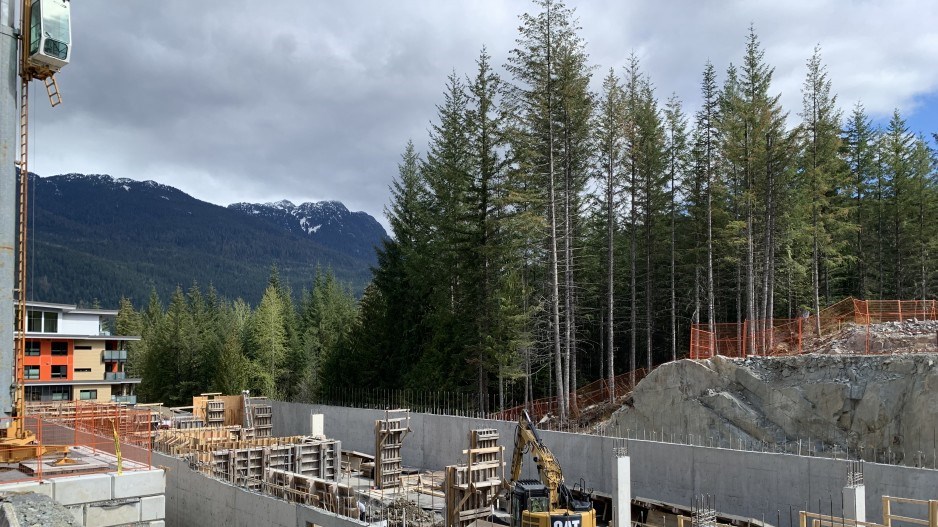In a move that was four decades in the making, the Whistler Valley Housing Society (WVHS) has finalized an agreement for its first affordable housing project since 1983, paving the way for the reinvigorated non-profit to fill in the gaps of Whistler’s housing spectrum.
On Tuesday, May 2, Whistler’s mayor and council adopted a housing agreement bylaw for 1400 Mount Fee Road in Cheakamus Crossing, a planned three-storey, 30-unit employee rental building that signals something of a paradigm shift in how Whistler typically delivers affordable accommodation.
“This is a really unique opportunity to invest in affordable rental accommodation for local residents, and we also want to, and have a vision and a mandate to, contribute to the spectrum of housing here,” said Whistler Councillor and WVHSboard chair Cathy Jewett. “One of the things we haven’t been able to do in our community is address potential social housing.”
Unlike Whistler Housing Authority (WHA) projects, prospective tenants do not have to be Canadian citizens or permanent residents to be eligible, although they will have to be legally able to work in Canada. Also unique to the project is its tiered rental system, which is designed for units with higher rents to subsidize those with lower rates. The building will be divided into three rental tiers: higher-rent units will be prioritized for essential service workers; mid-tier rents to the WHA waitlist; and lower rents to eligible employees who are also clients of social-service societies in the Sea to Sky.
“The idea is that we’ll hopefully be able to attract people that we’ve had difficulty attracting because of our housing market,” said Jewett.
The agreement also eschews the WHA pre-requisite mandating employees be based in Whistler for a minimum length of time in order to be eligible, making it easier for resort employers to bring in essential-service workers as the need arises. In this case, essential-service workers are defined in the agreement as “individuals who perform services that are critical to maintaining the health, safety, and community well-being of the population of Whistler, including medical workers, first responders, teachers and daycare workers, transit drivers and public works employees.”
The society still has to finalize how it will determine which essential workers get prioritized over others.
“That is the $64,000 question,” Jewett said. “We know we have some work to do on our tenancy selection policy, and so that’s our next step, working on that policy to ensure that it is transparent and fair and serves the community.”
Social-service clients are defined in the agreement as eligible employees who have been referred to the WVHS by a Sea to Sky non-profit or government agency dedicated to supporting the health and well-being of Whistlerites and will be selected and prioritized based on need (although the basis for selection would be kept confidential).
A maximum of 15 units will be designated for essential workers, and another 15 for social-service clients, with the remainder, if unfilled, going to employees on the WHA rental waitlist.
“It’s seen as important to the community that we have housing that’s more quickly available for essential services workers and folks that are identified as being in need through those social service agencies,” said municipal planning manager John Chapman in an April 18 presentation to council.
Under the agreement, the maximum rental rate for the units is set at $4 per square foot, meaning a 600-sq.-ft, one-bedroom apartment will cost up to $2,400 a month.
The agreement also allows tenants to rent the second room of a two-bedroom unit to an eligible employee at half the maximum rate, working out to $2/sq. ft.
Jewett acknowledged the relatively steep base rental rate, but said construction costs and financing being the way they are, it was important the society take action now.
“We’re able to finance this, but we can only finance it at the rents that cover our mortgage and our operating costs,” she explained. “The other thing you really have to consider when you build housing is that it’s really expensive right now, and people look at the potential rents and go, ‘Wow, that’s crazy.’ But in 10 years they will not be.”
The hope, Jewett said, is that social services agencies will be able to secure rental subsidies through BC Housing to help keep rates down.
Jewett has also personally lobbied officials at both the provincial and federal levels on the bevy of taxes—GST, PST and property transfer tax—paid on materials by the society, which, according to her calculations, add an additional estimated $100 in monthly rent per unit.
Formed in 1983 by a group of Whistler residents concerned about rising property prices in the resort, the WVHSendeavoured to create affordable housing in the resort, and its resulting 20-unit property on Sarajevo Drive in Creeksiderepresented Whistler’s first resident-restricted units.
The WVHS finally paid off that property in 2018, allowing it to finance the new build in Cheakamus Crossing built by the Whistler 2020 Development Corp.




